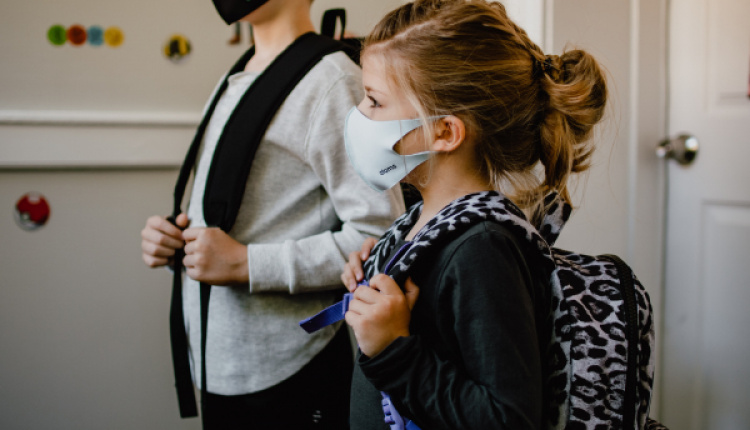How To Cope With Back-to-School Stress
- by XpatAthens
- Sunday, 12 September 2021

Back-to-school anxiety is normal and understandable. Many kids may feel anxious about going back to school after a long summer break. Others may feel nervous about starting school for the first time.
Regardless of what the case may be, parents can help ease the transition back to school by being able to recognize the symptoms of stress and anxiety and implementing some creative strategies.
Reasons Kids Might Be Stressed or Anxious
COVID-Related Concerns
For students who spent months out of traditional in-person classrooms due to the COVID-19 pandemic, going back to school may feel extra intimidating or even scary.
COVID-Related Concerns
For students who spent months out of traditional in-person classrooms due to the COVID-19 pandemic, going back to school may feel extra intimidating or even scary.
They might be worried about everything from wearing masks and being unvaccinated to wondering if they will still have the same friends after being gone so long. They also may feel uncertain about what school will be like now and whether or not they will even know their way around.
Concerns About Friends, Bullies, and More
Sometimes, kids are anxious or worried about the upcoming school year because of experiences with bullies. For many kids, this time away from school was a welcome reprieve from mean behavior and cutting remarks. So, as the new school year approaches, they may begin to worry that they will have to go through the same experiences again.
Sometimes, kids are anxious or worried about the upcoming school year because of experiences with bullies. For many kids, this time away from school was a welcome reprieve from mean behavior and cutting remarks. So, as the new school year approaches, they may begin to worry that they will have to go through the same experiences again.
Kids also might be stressed about appearance-related issues. Children from underserved communities and/or those living in poverty may worry about not having the right clothes or supplies. Other kids may worry about how others will view them especially if they have experienced weight changes, are now wearing glasses, have developed acne, or have recently gone through puberty.
Tips for Dealing With Stress and Anxiety
Foster Familiarity
As the school year approaches, it's important to help your child feel more comfortable about their new school environment. One of the things that can cause back-to-school anxiety for kids is not knowing what to expect.
Foster Familiarity
As the school year approaches, it's important to help your child feel more comfortable about their new school environment. One of the things that can cause back-to-school anxiety for kids is not knowing what to expect.
Help them become more acclimated to new routines and unfamiliar surroundings by talking through what they might expect to see. Allow them to ask questions and answer them honestly.
Another option to help build your child's comfort level is to make a couple of trips to and from school. Whether your child will walk, take a school bus, or be driven to school, helping them become familiar with the route may help ease back-to-school anxiety.
Be Positive
One way to help ease anxiety and stress about starting school is to remind your kids about what makes going to school great. Aside from learning new things and participating in extracurricular activities, there is a lot that is good about school.
One way to help ease anxiety and stress about starting school is to remind your kids about what makes going to school great. Aside from learning new things and participating in extracurricular activities, there is a lot that is good about school.
For starters, there's the fun new school supplies and clothes. There are also friends, teachers, and staff members they haven't seen in a while. Remind your kids what they can look forward to about school, such as time with friends, the playground, gym class, art class, or visits to the library.
Assure Them They Aren't Alone
Remind your kids that they're not the only ones who may be nervous about starting school again. Other students are likely to be just as anxious as they are about the first day of school. Reassure them too, that the teacher knows kids are nervous, and will probably spend time helping students feel more comfortable as they settle into the classroom.
Remind your kids that they're not the only ones who may be nervous about starting school again. Other students are likely to be just as anxious as they are about the first day of school. Reassure them too, that the teacher knows kids are nervous, and will probably spend time helping students feel more comfortable as they settle into the classroom.
Promote Healthy Living
One of the best ways to combat anxiety and stress is to address eating, sleeping, and exercise habits. Make sure kids get enough sleep and eat a balanced diet. Getting adequate sleep and eating healthy food, especially a balanced breakfast, is important for brain function, mood, and the ability to focus and pay attention in school.
One of the best ways to combat anxiety and stress is to address eating, sleeping, and exercise habits. Make sure kids get enough sleep and eat a balanced diet. Getting adequate sleep and eating healthy food, especially a balanced breakfast, is important for brain function, mood, and the ability to focus and pay attention in school.
Likewise, your kids need plenty of opportunities to burn off steam. Some kids like playing active sports while others enjoy a quiet afternoon reading or journaling. Every kid is different. So, make sure you're choosing activities that are truly stress-relievers for your child.
To read this article in full, please visit: verywellfamily.com
To read this article in full, please visit: verywellfamily.com

